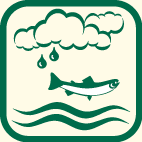


 Congressional Notebook
Congressional Notebook
|
 RMRS Publications
RMRS Publications
|
 Experimental Forests
Experimental Forests
|
 Partnerships
Partnerships
|
 US Forest Service Links
US Forest Service Links
|
 RMRS Archives
RMRS Archives
|
|
|


|
|
Home > Science Program Areas > Air, Water and AquaticsAir, Water and Aquatics Science
The Air, Water and Aquatics Science Program is committed to the development of knowledge and science applications related to air and water quality, as well as the habitat quality, distribution, diversity, and persistence of fish and other aquatic species. Air quality, water availability, water quality, and aquatic habitats are critical issues within the rapidly changing Western United States. Air, water, and aquatic resources are essential to society, as a life support and as an economic mainstay for individuals, communities, local and state governments. Forest and rangeland land management, coupled with human expansion has a significant influence on the quality and quantity of these resources. A long history of overgrazing by livestock, timber harvest, fire suppression, mining operations, recreational activities, road construction in valley and canyon bottoms and hill slopes, and dams and water diversions is impacting entire watersheds. Increasing dependence upon watersheds for off-site domestic water supplies, irrigation, and recreation has added complexity to the challenges faced by watershed managers. Natural disturbances, such as climate change and uncharacteristic fires and weather patterns are rapidly changing known patterns outdating current air, water, and aquatic management understanding and monitoring. Research is needed to understand natural processes, and how human management and other interventions impact these critical resources. The RMRS Air, Water and Aquatics Science Program objectives are aligned with our National Forest Strategic Plan and National Research and Development Strategic Program Areas:
|
|
Rocky Mountain Research Station
Last Modified: Wednesday, 17 December 2008 at 12:07:08 EST (Version 1.0.5)

